
|
GCOOS is the Gulf of Mexico regional component of the U.S. Integrated Ocean Observing System (IOOS). Our mission is to provide timely, reliable and accurate information on the open and coastal ocean waters of the Gulf of Mexico to ensure a healthy, clean, productive ocean and resilient coastal zone.
|
|
|
|
May 2017 - In This Issue:
|
|
|
|
|
Greetings!

This week, more than 120 of the world's leading cetacean scientists are gathered in Bled, Slovenia, for the scientific committee meeting of the International Whaling Commission to discuss the latest research on a wide range of subjects related to cetacean conservation and management.
I was honored to be invited as a guest of the IWC to attend a pre-conference workshop focused on harmful algal blooms, their impacts on human health and the crossover effects and implications for marine mammal health.
In addition to providing information on my research on the human health impacts of
Karenia brevis-caused HABs, I was fascinated to learn that Gulf of Mexico scientists have some of the strongest data available about the causes of marine mammal mortalities in the world. Yet there is much we don't know about the acute and sublethal effects of HAB events on cetacean populations even here. The same could be said of humans and points to the need for continued sampling on temporal and spatial scales relevant to both human health and coastal cetacean health.
I have no doubt that tools like gliders, HABscope, the Imaging Flow Cytobot and others being developed and tested in the Gulf of Mexico will continue to play a critical role in helping us understand and mitigate the impacts from HAB events here and internationally.
Until next month!
|
|
|
Nadine Slimak, Public Relations & Content Marketing, Vetted Communications, LLC
|
|
|
|
Join Us for Our Next G-CAN Webinar
|
 As part of G-CAN, the GCOOS Coastal Ocean Acidification Network, we're hosting a series of webinars about ocean acidification. Our goal is to identify vulnerabilities in the Gulf ecosystem that may be impacted by OA, foster collaborations to increase ocean observations and develop strategies to help mitigate impacts. As part of G-CAN, the GCOOS Coastal Ocean Acidification Network, we're hosting a series of webinars about ocean acidification. Our goal is to identify vulnerabilities in the Gulf ecosystem that may be impacted by OA, foster collaborations to increase ocean observations and develop strategies to help mitigate impacts.
Our next webinar will feature Dr. Xinping Hu, from the Department of Physical and Environmental Sciences at Texas A&M University, Corpus Christi.
Dr. Hu's work focuses on issues related to carbonate chemistry in estuarine and oceanic waters, sediment geochemistry, and the marine carbon cycle. His ongoing NOAA-funded study is focused on examining the influence of freshwater inflow and hypoxia on the acidification of subtropical estuaries in south Texas.
|
|
|
GCOOS Members Creating Ocean Technology Education Opportunities
|
With 15 ports, major shipbuilders, coastal tourism and substantial fisheries, Mississippi's "blue economy" contributes billions of dollars to the state's annual revenues. While 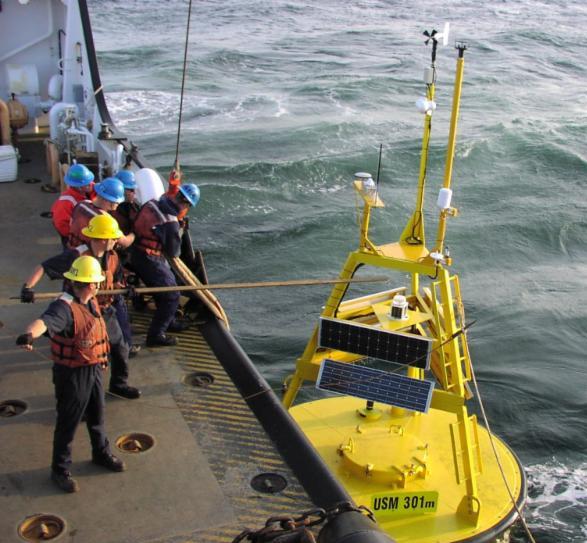 these maritime industries dominate the state's economy and support at least 35 percent of its entire workforce through "blue" jobs, the sector is often overlooked as a source of economic development for the state. these maritime industries dominate the state's economy and support at least 35 percent of its entire workforce through "blue" jobs, the sector is often overlooked as a source of economic development for the state.
Now, GCOOS members based at John C. Stennis Space Center complex are working to change that by developing new programs aimed at training a workforce knowledgeable in the tools and technologies that are crucial for maritime operations and for gaining a better understanding of the oceanic and coastal environments in the Gulf of Mexico.
The programs and opportunities being developed by ocean experts Joe Swaykos, Chief Scientist of the NOAA National Data Buoy Center and Secretary of the GCOOS Board of Directors, and Dr. Monty Graham, a GCOOS member and Director of the University of Southern Mississippi's (USM) new School of Ocean Science and Technology, will help train new generations of experts in the operation of ocean-based robot systems and increase internship and employment opportunities for students and graduates.
|
 |
|
 |
Students guide mini ROVs in a pool as they learn how these ocean observing tools collect video in real-world research. Photo courtesy of Pontchartrain Elementary School.
|
Since its inception, GCOOS has supported outreach and education activities aimed at increasing ocean literacy. That includes providing opportunities for youngsters to learn about ocean science.
In April, GCOOS and partners
helped provide ocean science learning opportunities to nearly 800 Pre-K through third grade students from Pontchartrain Elementary School (on the north shore of Lake Pontchartrain in Louisiana) during an Earth and Science Day Festival celebrating
Earth Day 2017
.
Students visited booths and participated in interactive presentations by the University of Southern Mississippi's (USM) Department of Marine Science and the Student Chapter of the Marine Technology Society (MTS), NOAA, NASA and the Naval Oceanographic Office (NAVO).
|
GERG Marks Glider Deployment Record
|
 The Geochemical & Environmental Research Group at Texas A&M University (GERG) marked a record glider deployment recently after the Slocum glider Stommel spent 106 days patrolling the Gulf of Mexico. The Geochemical & Environmental Research Group at Texas A&M University (GERG) marked a record glider deployment recently after the Slocum glider Stommel spent 106 days patrolling the Gulf of Mexico.
Launched on Jan. 20, the glider was picked up after traveling a total of 905.5 km. It collected data for 104 days and came back with an impressive 30 percent of its lithium battery life remaining (which equates to about three-four weeks of battery life left).
The glider had a good bit of fouling, including algae hairs and barnacle growth, but otherwise seemed to be in pretty good shape.
|
NEW: Loop Current & Eddies Alliance
|
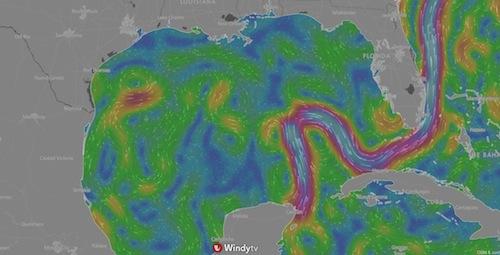 Following on the success of the Loop Current Eddies Workshop during last year's Offshore Technology Conference, a new group has been formed to continue the dialogue on the strong currents and eddies impacting the marine working environment. The new Loop Current & Eddies Alliance (LCEA) was created to serve as a resource for those affected by, researching and mitigating the Gulf of Mexico Loop Current and other strong currents. Following on the success of the Loop Current Eddies Workshop during last year's Offshore Technology Conference, a new group has been formed to continue the dialogue on the strong currents and eddies impacting the marine working environment. The new Loop Current & Eddies Alliance (LCEA) was created to serve as a resource for those affected by, researching and mitigating the Gulf of Mexico Loop Current and other strong currents.
This independent and non-commercial organization strives to:
- Address and seek solutions to operational/HSSE challenges and impacts due to strong currents, especially related to the GoM Loop Current Eddies;
- Identify, establish, and share of best practices and guidelines;
- Bring together interested and knowledgeable professionals who seek understanding of and solutions for the Loop Current system; and

- Identify research opportunities to improve forecast, observation, and mitigation.
Visit the new group's website for more information and to join. Membership is free.
|
|
Ocean Action Agenda Released
|
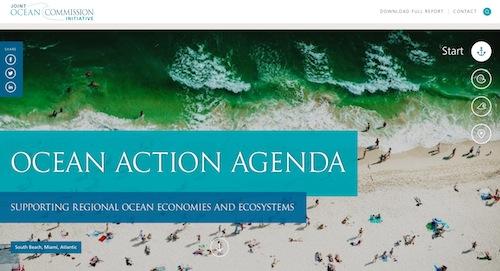
The Joint Ocean Commission Initiative has released the Ocean Action Agenda, a report detailing ocean and coastal policy actions that should be taken by the Trump Administration and Congress to allow present and future generations of Americans to benefit from the jobs, food, health, recreation and overall well-being that America's oceans, coasts and Great Lakes provide.
The Ocean Action Agenda was developed by a bipartisan group of senior leaders in conjunction with local, state and regional leaders from the Arctic to the Gulf of Mexico. Actions are organized into nine priority areas the Trump Administration and Congress should tackle over the next four years:
- Build strong coasts and economies
- Support regional collaboration
- Be an international leader
- Invest in science and research
- Prioritize U.S. interests in the Arctic
- Support healthy economies and ecosystems
- Foster sustainable fisheries
- Facilitate responsible offshore energy
- Support an ocean investment fund
- Read the report
|
|
Global Observing System Webinar Now Available
|
|
A globally coordinated and sustained ocean observing system is urgently needed to assess the state of the ocean's biological resources and ecosystems, address national management needs and evaluate progress towards the 2030 targets of the UN Sustainable Development.
A video of a webinar recently hosted by the Biology and Ecosystems Panel of the Global Ocean Observing System (GOOS BioEco), the Marine Biodiversity Observation Network (MBON) of the Group on Earth Observations Biodiversity Observation Network (GEOBON) and the Ocean Biogeographic Information System (OBIS) on this topic is now available on YouTube. Presenters included GCOOS PI Dr. Frank Muller-Karger, Dr.
Nic Bax, Director NERP Marine Biodiversity Hub, and Eduardo Klein, of the Universidad Simon Bolivar.
|
Congratulations to CARICOOS, which recently became the fifth regional association 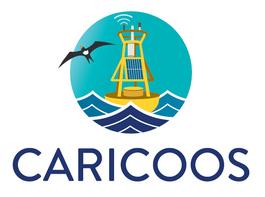 to be certified as a Regional Information Coordination Entity (RICE).
IOOS is directed by the Integrated Coastal and Ocean Observation System Act of 2009 to certify and integrate regional associations into the U.S. IOOS. Integration formally establishes the role of associations in the U.S. IOOS and ensures that the data collected and distributed by the associations are managed according to the best practices. to be certified as a Regional Information Coordination Entity (RICE).
IOOS is directed by the Integrated Coastal and Ocean Observation System Act of 2009 to certify and integrate regional associations into the U.S. IOOS. Integration formally establishes the role of associations in the U.S. IOOS and ensures that the data collected and distributed by the associations are managed according to the best practices.
|
 Dispatches from the Gulf featured the University of South Florida in a recent segment focused on Gulf of Mexico sediment. The USF team uses a multi-corer to build a history of the Gulf. Dispatches from the Gulf featured the University of South Florida in a recent segment focused on Gulf of Mexico sediment. The USF team uses a multi-corer to build a history of the Gulf.
- Watch "Exquisite Mud: A History Book of the Gulf of Mexico"
|
|
GRP Awards $3.2 Million in Capacity-Building Grants
|
 The Gulf Research Program announced recipients of 12 capacity-building grants, totaling almost $3.2 million. The Gulf Research Program announced recipients of 12 capacity-building grants, totaling almost $3.2 million.
These competitive grants support community organizations as they conduct science-based projects designed to benefit their coastal communities from the Gulf of Mexico to Maine to Alaska.
|
|
Building Better Nav Charts
|
NOAA is seeking public comment on the recently released 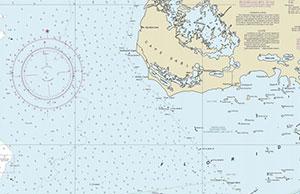 National Charting Plan, a strategy to improve NOAA nautical chart coverage, products and distribution. It describes the evolving state of marine navigation and nautical chart production, and outlines actions that will provide the customer with a suite of products that are more useful, up-to-date, and safer to navigate with. National Charting Plan, a strategy to improve NOAA nautical chart coverage, products and distribution. It describes the evolving state of marine navigation and nautical chart production, and outlines actions that will provide the customer with a suite of products that are more useful, up-to-date, and safer to navigate with.
- Comments due: Midnight, June 1
- Details
|
Mississippi Restoration Expenditure Plan Approved
|
|
The Mississippi Department of Environmental Quality (MDEQ) has announced that the state's initial State Expenditure Plan has been approved by the Gulf Coast Ecosystem Restoration Council (RESTORE Council). The $49.8 million plan describes projects and programs that Mississippi will fund under RESTORE Act.
|
Restoration Funding Calendar
- NOAA RESTORE Act Science Program hosts a three-year calendar that consolidates planned funding opportunities
By State:
|
Port St. Pete Targets Marine Research
|
|
Many ports work to attract cruise ships or to become a gateway for trade, but Port St. Pete in Florida is positioning itself for a much different role. With a $5 million newly renovated wharf, it is working to become an international marine research port.
|
Unlocking the Secrets in the Gulf of Mexico
|
In
Popular Mechanics, reporter Kevin Dupzyk writes about Drs. Stephan Howden, University of Southern Mississippi, and Steve DiMarco, from Texas A&M, deploying sensors on the Shell Oil Company's
floating production, storage and off-loading facility (FPSO), the
Turritella,
in the Gulf of Mexico.
|
PostDoc & Early Career Opps
|
PathwaysToScience.org has 167 postdoc and early career opportunities posted on its website, including postdoctoral fellowships, grants, travel awards, mentoring opportunities and more.
|
GRIIDC Offers Two Positions
|
The Gulf of Mexico Research Initiative Information and Data Cooperative is looking for a Software Applications Developer who can develop a free, open-source software solution to promote ope data and open science as well as a Research Specialist who can organize and document data to promote a culture of open data and open science in the Gulf of Mexico.
GRIIDC is based out of the Harte Research Institute for the Gulf of Mexico Studies at Texas A&M University-Corpus Christi.
|
Director -- Koshland Public Engagement Program
|
| The Koshland Public Engagement Program seeks a Director who will plan, develop and direct Koshland Public Engagement Program in the fulfillment of its mission to inspire people to use science to solve problems.
|
Science Writer and Coordinating Editor: Coastal and Estuarine Science
|
The Coastal and Estuarine Research Federation (CERF) seeks a freelance Science Writer/Coordinating Editor for Coastal and Estuarine Science News (CESN). CESN is an electronic newsletter put out on a bimonthly basis (6 issues per year) that serves as a companion to the journal Estuaries and Coasts. Each issue of CESN provides a summary of four articles from the journal, written for an audience of coastal managers and other interested stakeholders and emphasizing the management applications of scientific findings. Issues are posted online (www.erf.org/cesn) and emailed out to subscribers and CERF members. The work of CESN is managed by a volunteer editor-in-chief and contributing editors (the "Editorial Board").
Qualifications:
- Excellent English writing skills; strong proofreading and copy-editing abilities
- Proven experience with reading and synthesizing primary scientific literature; background in marine science or related fields preferred
- Excellent organizational and time-management skills
- Strong interpersonal skills
- Self-motivated with strong work ethic
- Experience working remotely with a large team (e.g., comfort with online communications and technology, ability to coordinate without face-to-face meetings)
- Creative thinker preferred. Willing to think innovatively about process efficiency, marketing to expand reach, and similar ideas.
- To apply: Submit your resume, cover letter, and 3-5 writing samples (or links to online content) by email to [email protected] with the subject "CESN position."
- Deadline: Review of applicants will begin on May 22; please submit by this date to receive top consideration.
|
FeedMeltPath hiring Post-Doc
|
Dr. Inga Koszalka is hiring a postdoc for his FeedMeltPath project considering tracing Greenland glacier melt water and its interactions with ambient circulation. The project is a part of a large German project cluster GROCE (GReenland ice sheet/OCEan interaction). The focus is on the 79N-Glacier (NE Greenland) and will be tracking the glacier melt water, mixing processes and fresh water budgets over the East Greenland Shelf and the subpolar North Atlantic. The job involves configuration of Lagrangian codes for FESOM and GETM models in collaboration with modeling groups at AWI (C. Wenerkle) and IOW (H. Burchard) (prototype codes are existing and may be further developed/developing alternative codes) followed by a suite of Lagrangian experiments and analyses addressing the project's objectives. The study will be linked to the model intercomparison studies of the FAMOS group.
- For more information, please contact Dr. Inga Koszalka at the GEOMAR Helmholtz Center for Ocean Research in Kiel, Germany.
|
Earthwatch Looks to Fund Proposals from Field-based Scientist that Engages Citizen-Scientist Volunteer
|

Earthwatch is currently seeking proposals from scientists for field-based research that engages citizen-scientist volunteers (recruited by Earthwatch) in data collection for projects that will start in 2019, and that address key conservation and sustainability issues in the following areas:
- Global Conservation Priorities
- Glaciology and Polar Ecology
- Ocean Ecosystems
- Restoration Ecology
- Rewilding the UK
- Sustainable Agriculture and Forest Ecosystems
- Urban Resiliency
- Boston Urban Resiliency
Earthwatch is prioritizing research that helps increase understanding of global change.
|
Louisiana Sea Grant 2018-2020 Omnibus Research Request for Proposals
|
| Proposals should promote interdisciplinary solutions using university research to address complex and interrelated ecological, economic and social challenges that affect the state's adaptation strategies. The Statements of Interest were due March 3, 2017. Full proposals are due May 22, 2017. |
Florida Sea Grant Biennial Call for Proposals 2018-2020
|
Proposals must address the new Florida Sea Grant College Program Priorities that reflect healthy coastal environments; sustainable fisheries and aquaculture; resilient communities and economies; and, environmental literacy and workforce development. The Call for Statement of Interest deadline was February 13, 2017. If invited, full proposals are due May 29, 2017.
|
May
The 3rd Blue Planet Symposium is a forum for discussion of societal information needs about the oceans. The symposium will also be a platform for the participating communities to exchange information on their activities and identify potential pilot and prototype projects for Blue Planet to focus on in the coming years.
Additionally, GEO Blue Planet requests community input on ocean observing capabilities and user information needs related to the Blue Planet symposium sessions. All interested parties are encouraged to submit input on these topics. Submissions received by May 15 will be used for symposium preparation and shared on the symposium website.
Gulf of Mexico Climate Community of Practice Annual Meeting, bringing together extension, outreach and education professionals with community officials in the Gulf to learn how coastal communities can adapt to sea-level rise, precipitation changes and other climate-related issues. May 16-18, 2017, Covington, Louisiana
June
June 18-23, 2017, Stonehill College, Easton, Mass.
The 2017 Gordon Research Conference (GRC) on Mycotoxins and Phycotoxins will provide a forum for academic, government and private sector scientists to exchange ideas on harnessing advances in biology, chemistry, ecology, plant pathology, epidemiology and risk assessment to address the problems associated with occurrence of these natural toxins.
September
International Radiowave Oceanography Worshop, September 19-21, 2017 in Luneburg, Germany. The successful series of the international Radiowave Oceanography Workshop (ROW) has focused on the scientific aspects of ocean applications of high frequency radars. ROW 2017 is the next in this series and will provide a forum for researchers to discuss their results, swap data and algorithms, and identify priorities for future research.
If you would like to participate please refer to the registration section. See the Important dates.
Other Gulf-Related Events
Have a meeting, job or funding announcement? Please email details to Laura Caldwell at GCOOS.
|
|
|
|
|